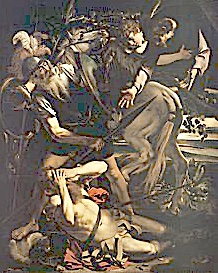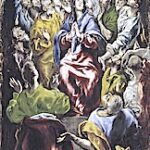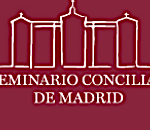Illustration: The Conversion of Saint Paul, Caravaggio, 1600
Homily of Pope Francis at celebration of second vespers
on the solemnity of the conversion of St. Paul the apostle
during 57th Week of Prayer for Christian Unity
in the Basilica of St. Paul Outside the Walls
Thursday, January 25, 2024
Gospel (Luke 10:35-37)
There was a scholar of the law* who stood up to test him and said, “Teacher, what must I do to inherit eternal life?” Jesus said to him, “What is written in the law? How do you read it?” He said in reply, “You shall love the Lord, your God, with all your heart, with all your being, with all your strength, and with all your mind, and your neighbor as yourself.” He replied to him, “You have answered correctly; do this and you will live.”But because he wished to justify himself, he said to Jesus, “And who is my neighbor?” Jesus replied, “A man fell victim to robbers as he went down from Jerusalem to Jericho. They stripped and beat him and went off leaving him half-dead. A priest happened to be going down that road, but when he saw him, he passed by on the opposite side. Likewise a Levite came to the place, and when he saw him, he passed by on the opposite side. But a Samaritan traveler who came upon him was moved with compassion at the sight. He approached the victim, poured oil and wine over his wounds and bandaged them. Then he lifted him up on his own animal, took him to an inn and cared for him. The next day he took out two silver coins and gave them to the innkeeper with the instruction, ‘Take care of him. If you spend more than what I have given you, I shall repay you on my way back.’ Which of these three, in your opinion, was neighbor to the robbers’ victim? He answered, “The one who treated him with mercy.” Jesus said to him, “Go and do likewise.”
Pope Francis Homily
In the Gospel we have heard, the Doctor of the Law, although he addresses Jesus and calls him “Teacher,” he does not want to be taught by him, but to “test him.” An even greater falsehood is revealed in his question, “What must I do to inherit eternal life?” (Lk 10:25).
Do (so as) to inherit, do (so as) to have: here is a distorted religiosity, based on possession rather than gift, where God is the means to get what I want, not the end to be loved with all my heart.
But Jesus is patient and invites that doctor to find the answer in the Law of which he was an expert, which says, “You shall love the Lord your God with all your heart, and with all your soul, and with all your strength, and with all your mind, and your neighbor as yourself” (Luke 10:27). Then that man, “wanting to justify himself,” asks a second question, “And who is my neighbor?” (Lk 10:29).
If the first question threatened to reduce God to one’s “self,” this one seeks to divide: to divide people into those whom one should love and those whom one can ignore.
And division never comes from God: it is from the devil, who is divisive.
Jesus, however, does not respond with a theory, but with the parable of the Good Samaritan, with a concrete story, which also challenges us.
it is the priest and the Levite who behave badly and indifferently, putting the needs of the suffering above the protection of their religious traditions.
Instead, the one who gives meaning to the word “neighbor” is a heretic, a Samaritan, because he makes himself a neighbor: he feels compassion, approaches the brother and bends over his wounds with tenderness; he cares for him, regardless of his past and his faults, and serves him with all his being.
This leads Jesus to conclude that the right question is not “Who is my neighbor?” but “Do I make myself a neighbor?” Only this love that becomes free service, only this love that Jesus preached and lived, only this love will bring Christians who are separated closer together
Yes, only this love that does not go back to the past to distance itself or to point fingers, only this love that in the name of God puts the brother before the iron defense of its own religious system, only this love will unite us. First the brother, after the system.
Brothers and sisters, among ourselves we should never ask the question “who is my neighbor?”
Because every baptized person belongs to the same Body of Christ; and more, because every person in the world is my brother, my sister, and we all make up the “symphony of humanity,” of which Christ is the firstborn and the redeemer.
As St. Irenaeus, whom I had the joy of proclaiming a “Doctor of Unity,” reminds us, “whoever loves the truth must not be carried away by the difference of each sound nor imagine that one is the maker and creator of this sound and another the maker and creator of the other [. . . ] but must think that he has made it one” (Adv. haer. II, 25, 2).
Therefore, not “who is my neighbor?” but “do I make myself a neighbor?”
Do I and then my community, my Church, my spirituality, make themselves neighbor?
Or do they remain barricaded in defense of their own interests, jealous of their autonomy, trapped in the calculation of their own benefits, entering into relationships with others only to gain something from them? If so, these are not just strategic mistakes, but infidelity to the Gospel. “What must I do to inherit eternal life?”: this is how the dialogue between the Doctor of the Law and Jesus began.
New Testament Reading for the Conversion of Saint Paul: Acts of the Apostles (Acts 22:3-16)
Paul said to the people, ‘I am a Jew and was born at Tarsus in Cilicia. I was brought up here in this city.
I studied under Gamaliel and was taught the exact observance of the Law of our ancestors.
In fact, I was as full of duty towards God as you are today. I even persecuted this Way to the death and sent women as well as men to prison in chains as the high priest and the whole council of elders can testify, since they even sent me with letters to their brothers in Damascus. When I set off it was with the intention of bringing prisoners back from there to Jerusalem for punishment.
‘I was on that journey and nearly at Damascus when about midday a bright light from heaven suddenly shone round me. I fell to the ground and heard a voice saying, “Saul, Saul, why are you persecuting me?” I answered: Who are you, Lord? and he said to me, “I am Jesus the Nazarene, and you are persecuting me.” The people with me saw the light but did not hear his voice as he spoke to me.
I said: What am I to do, Lord? The Lord answered, “Stand up and go into Damascus, and there you will be told what you have been appointed to do.” The light had been so dazzling that I was blind and my companions had to take me by the hand; and so I came to Damascus.
‘Someone called Ananias, a devout follower of the Law and highly thought of by all the Jews living there, came to see me; he stood beside me and said “Brother Saul, receive your sight.”
Instantly my sight came back and I was able to see him. Then he said, “The God of our ancestors has chosen you to know his will, to see the Just One and hear his own voice speaking, because you are to be his witness before all mankind, testifying to what you have seen and heard. And now why delay?
It is time you were baptized and had your sins washed away while invoking his name.”
But today, thanks to the Apostle Paul, whose conversion we celebrate in the Basilica dedicated to him, even this first question is turned around.
Just as Saul of Tarsus, the persecutor of Christians, meets Jesus in the vision of light that envelops him and changes his life, he asks him, “ What am I to do, Lord?” (Acts 22:10).
Not “what shall I do to inherit?” but “what shall I do, Lord?”.
The Lord is the goal of the request, the true inheritance, the ultimate good.
Paul does not change his life because of his goals; he does not become better because he fulfills his plans. His conversion is the result of an existential inversion, in which the priority is no longer his ability before the law, but his docility before God, in total openness to what he wants.
Not his ability, but his docility: from ability to docility.
If He is the treasure, our church program can only be to do His will, to go out to fulfil His desires.
And the night before He gave His life for us, he prayed fervently to the Father for all of us, “that they may all be one” (Jn. 17:21). Here is His will.
All efforts to achieve full unity are called to follow the same path as Paul, to put aside the centrality of our ideas so as to listen to the voice of the Lord and to leave initiative and space to Him.
This was well understood by another Paul, a great pioneer of the ecumenical movement, Abbé Paul Couturier, who used to pray and implore the unity of believers “as Christ wants it,” “by the means He wills.” We need this conversion of perspective and, above all, of heart, because, as the Second Vatican Council stated sixty years ago “ “there can be no true ecumenism without interior conversion”.
As we pray together let us recognize, each starting with ourselves, that we need to be converted, to allow the Lord to change our hearts. This is the way: to walk together and serve together, serve together, with prayer at the center. In fact, as Christians mature in the service of God and neighbor, they also grow in mutual understanding, as the Council again declares, “For the closer their communion with the Father, with the Word and with the Holy Spirit, the more intimate and easier they will be able to make fraternity with one another”.
This is why we are here tonight from different countries, from different cultures and traditions.
I am grateful to His Grace Justin Welby¸ Archbishop of Canterbury, Metropolitan Polycarp, representing the Ecumenical Patriarchate, and to all of you who represent many Christian communities.
I extend a special greeting to the members of the International Joint Commission for Theological Dialogue between the Catholic Church and the Eastern Orthodox Churches, which is celebrating their 20th anniversary, and to the Catholic and Anglican bishops participating in the meeting of the International Commission for Unity and Mission.
It is beautiful that today, together with my brother, Archbishop Justin, we can give these pairs of Bishops the mandate to continue to bear witness to the unity that God wants for his Church in their respective regions, and to move forward together “to spread God’s mercy and peace to a world in need”.
I also greet the student scholars of the Committee for Cultural Collaboration with the Orthodox Churches of the Dicastery for Promoting Christian Unity and the participants in the study visits organized for young priests and monks of the Eastern Orthodox Churches, and for students at Bossey Ecumenical Institute of the Ecumenical Council of Churches.
Together, as brothers and sisters in Christ, we pray with Paul saying, “What shall we do, Lord?”
And in asking the question there is already an answer, because the first answer is prayer.
Praying for unity is the first task of our journey. And it is a holy task, because it is to be in communion with the Lord, who first of all prayed to the Father for unity. And we continue to pray as well for the end of wars, especially in Ukraine and the Holy Land. A heartfelt thought also goes to the beloved people of Burkina Faso, especially the communities there who have prepared materials for the Week of Prayer for Unity: may love of neighbor take the place of the violence that plagues their country.
Paul says “”What shall I do, Lord?” And the Lord,”, “said to me, ‘Get up and go on’” (Acts 22:10).
Arise, Jesus says to each of us and to our quest for unity. Let us, then, in the name of Christ, rise up from our weariness and our habits, and let us go on, let us go forward, because He wills it, and He wills it “that the world may believe” (Jn. 17:21). Let us pray, then, and let us go forward, because this is what God wants us to do.


